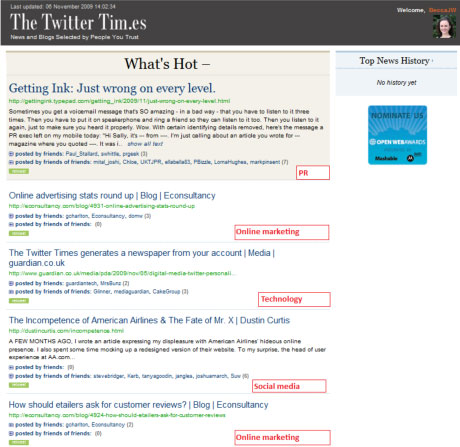I’ve been avidly following the debate about the future of print media, and it’s certainly not difficult to find fresh opinions on what’s going to happen next. It’s a topic that has captured many people’s imaginations and everyone has questions to ask: can publishers adapt; will consumers define the new model; how is the internet driving change?
Whilst I sympathise with publishers who are currently facing plummeting circulation figures, failing advertising revenue streams and uncontrollable plagiarism of their “exclusives” across the web, I can also see why consumers see no reason to pay for a printed version of something that they can read online for free. Can a compromise be reached?
An interesting development that combines the new world of social media and the ageing world of newspapers caught my eye last week. It’s called The Twitter Times.
Knowing what’s important to you
We all have our allegiances to certain newspapers, magazines and websites; we excitedly await their arrival on our doorstep or logging on to read the latest debate on topics that are important to us.
The Twitter Times takes the concept of reflecting your personal interests one step further. It is essentially a bespoke online newspaper which collates news and blog posts from items shared by your Twitter connections. It also aims to expand your horizons by including articles from the followers of your followers which it supposes might also be of interest to you.
All about me
Since I use my Twitter account on a largely professional basis, my connections fall into rather distinct categories: social media; online marketing; PR; technology; celebrity.
Thankfully, this is clearly reflected in my personalised edition of The Twitter Times:

What does the future hold?
I’m not suggesting that The Twitter Times offers us the answer to the conundrum of paid vs. free content (it’s currently a free application, after all), but it certainly offers some food for thought to more traditional publishers about delivering content that people really want.
We all know that we’re more likely to follow a recommendation from a friend than one from a stranger, so it makes sense that we would rather read articles endorsed by our contacts than by an editor we’ll probably never meet.
Content that is fresh, relevant and accurate is vital for the success of the media, and the stickiness of any website. If you’re after a bit of advice about content management and producing information that will meet the needs of your particular audience (and the search engines), get in touch. We’d love to help.
